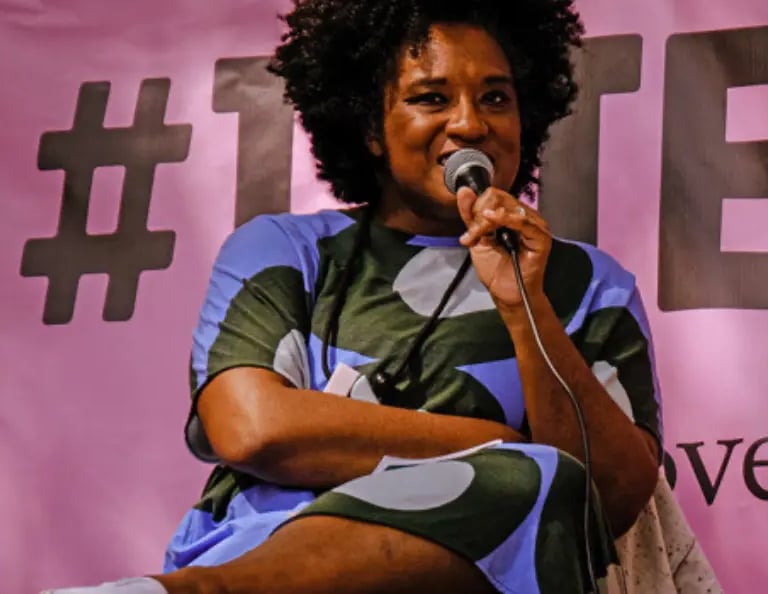Aja Barber: Confronting Fashion’s Colonial Legacy Through Conscious Consumerism
PEOPLE & STORIES


In an industry built on image, where trends move at the speed of scrolling and profit often comes at the expense of ethics, Aja Barber stands out as a critical voice of reckoning. A writer, speaker, and consultant, Barber has become one of the most powerful figures in the slow fashion movement, carving out space for conversations that link climate justice, colonialism, race, and the deeply broken systems that drive our consumption habits. Through her work, she not only critiques the global fashion industry but also empowers everyday consumers to reimagine their relationship with clothing, capitalism, and the planet.
Barber’s personal journey is inseparable from her activism. Growing up in a working-class Black family in an affluent area, she learned early on how class and appearance intersected. Like many young people, she once sought identity and belonging through fashion — drawn to the same fast fashion machines she would later critique. But over time, as she began to uncover the exploitative realities behind her wardrobe, Barber's relationship with fashion evolved into something deeper: a form of activism. She began to explore and expose the connections between the climate crisis, global inequality, and the fashion industry's relentless pursuit of growth at any cost. This personal evolution laid the groundwork for a career dedicated to helping others unlearn the consumption patterns shaped by capitalism and colonialism.
Her debut book, Consumed: The Need for Collective Change: Colonialism, Climate Change, and Consumerism, published in 2021, is a manifesto for rethinking the way we live and buy. In Consumed, Barber pulls back the curtain on the fashion industry’s darkest truths — from the exploitative labour practices in garment factories to the environmental devastation caused by overproduction and textile waste. What sets her work apart is the way she weaves history, politics, and identity into the conversation. Barber does not let readers forget that the exploitation of garment workers — predominantly women of colour in the Global South — is not a glitch in the system but a continuation of colonial extraction. The book is structured in two parts — “Learning” and “Unlearning.” In “Learning,” Barber outlines the global forces that have allowed the fashion industry to thrive unchecked, while “Unlearning” invites readers to examine their own complicity and how they might begin to do better, without falling into the trap of guilt-driven perfectionism.
One of Barber’s most important contributions to this space is her ability to dissect the illusion of ethical consumerism. While she encourages people to buy better and more consciously, she is also deeply critical of the idea that we can shop our way into sustainability. She questions the commercialisation of “eco-friendly” and “ethical” labels, particularly when those terms are co-opted by the same corporations responsible for systemic harm. For Barber, true change isn’t about swapping one type of shopping for another — it’s about questioning why we consume so much in the first place, and who benefits from that system. She reminds us that no single purchase will save the world — but informed, intentional living can help shift the culture of consumption we’re all embedded in.
Barber’s impact stretches far beyond the pages of her book. She is a prolific speaker and educator, regularly sharing her insights in interviews, panel discussions, and across digital platforms. Her TEDx Talk, “How Fashion and Consumerism Hijacked Our Values,” has resonated globally, offering a sobering yet empowering reflection on the cultural and environmental consequences of our addiction to cheap fashion. In her own words, “We can’t buy our way to a better world — but we can start changing it by consuming less, consuming better, and asking harder questions.” This quote captures the essence of her message: a refusal to settle for surface-level solutions and a demand for deeper accountability.
What makes Barber’s voice so powerful is not just her knowledge, but her unflinching honesty and the moral clarity she brings to the conversation. She doesn’t shy away from calling out greenwashing, performative allyship, or the complicity of influencers and consumers in sustaining harmful systems. At the same time, her tone is not one of blame, but of invitation — an appeal to all of us to live more consciously, more courageously, and more compassionately. She meets readers and audiences where they are, and encourages progress, not perfection.
Aja Barber is part of a growing wave of thinkers, educators, and creators reshaping the future of fashion and sustainability. But what distinguishes her is her insistence on justice — not just environmental justice, but racial, economic, and social justice, too. She forces us to see how deeply entangled these issues are and challenges us to disentangle ourselves from the comfort of ignorance.
As the world continues to grapple with the climate crisis and questions of equity become ever more urgent, Barber’s voice is one we cannot afford to ignore. Her work serves as both a mirror and a roadmap: reflecting the uncomfortable truths of our current systems while guiding us toward something better, something more honest, more human, and more hopeful.


